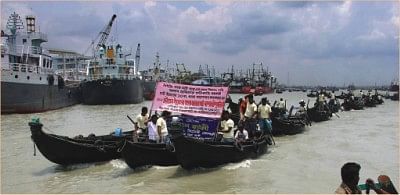Sampan race to save river Karnaphuli

Sampan Majhi Kalyan Samity Federation and Chattagram Anchalik Sangskriti Academy organise a sampan procession in the river Karnaphuli. Photo: ANURUP KANTI DAS
The river Karnaphuli can not be imagined without sampan and its majhi (boatman).
Many songs, poems and folk rhymes have been versed on the river Karnaphuli and its sampan and majhis like “O re sampan oala tui omare korli dioyana” (oh my boatman you have made me mad).
The traditional sampan and their majhis are disappearing day by day as a section of industrialists and influential quarters are illegally grabbing the banks and ghat (mooring) of the river.
Around 800 small and big factories are releasing wastes in the river daily causing damage to its biodiversity. As a result, many of fishermen who live on fishing in the river have already lost their livelihoods and rests are eking out their existence.
The boatmen who take people or goods to the either banks of the river are losing their livelihood after the influential quarters take the ghats lease from the Chittagong City Corporation (CCC), forcing them to give tolls at a higher rate or change their profession.
To save the river from the encroachers and pollution as well as their existence, the sampan majhis organised a three-day sampan khela (boat race) and Chantgaiya (Chittagong) cultural fair in the river Karnaphuli and its field adjacent to Char Pathar Gatha in the port city.
Sampan Majhi Kalyan Samity Federation (SMKSF) in association with Chattagram Anchalik Sanskriti Academy (CASA) organised the events titled “We are boatmen of the river Karnaphuli and we have pledged to save the river”.
The boatmen took out a procession of 300 traditional sampans carrying colourful banners and festoons with a slogan “Dorjar kulat bas gori aanra sampan majhi, Karnaphuli raksar lai jiban railam baji”.
The procession began from the Aboymitra Ghat ended at Fery Ghat via Bangla Bazar.
Fishermen, boatmen and local villagers thronged the fair at Chittagong Development Authority (CDA) ground at Char Pathar Ghata. A huge number of village women crowded the fair.
A seminar and folk poets' duel were held on the first day where 30 folk professional versifiers depict how the Karnaphuli, economic lifeline of the country, is gradually turning into a dead river through their beautiful songs and verses.
The duels started with the beating of dhol (folk drum) of Babul Jaladas, son of Ekushey award winner drum player Binoy Banshi. The bards narrated the history of the river and how it was named Karnaphuli and its present condition saying that the life of the river is at stake.
Thousands of people enjoyed the sampan race from the river bank on the concluding day of the fair.
Prof Edris Ali, one of the organisers of the fair and researcher on the river Karnaphuli, told The Daily Star that the port city, its culture and traditions including sampan and sampan majhi and their livelihoods all have been shaped centring the river.
“So we need a massive social movement to save the river”, he said, adding that if condition of the river deteriorates, not only will the boatmen lose their jobs but also whole economy will be at stake.
He said 60 percent of the wastes and garbage of the city fall into the river through the canals and 25 to 30 percent of insecticides and chemicals used in the farm lands are falling into the river causing pollution to the river.
“If the present condition continues the fishes of different species of the river will be on the verge of extinction threatening the livelihoods of the boatmen as well as the fishermen and causing health hazard to the city people,” he added.
Emphasising capital dredging of the river, Prof Edris said the influential people and organisations have grabbed the moorings inside the river hindering its main current that helps strips of islands to emerge”.
He said around 76 fish species were found available in the river in 1972 but now no sweet water fish species are seen.
SM Payar Ali, president of SMKSF said to save the river from pollution and the encroachment they arranged the events.
Aliur Rahman, director of the CASA and an organiser of the movement, said this kind of events will help protect the river from the grabbers as well as the pollution.

 For all latest news, follow The Daily Star's Google News channel.
For all latest news, follow The Daily Star's Google News channel. 



Comments